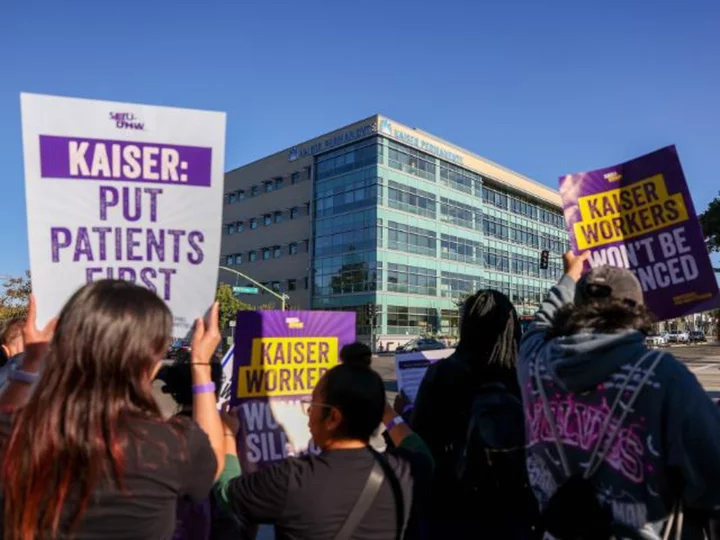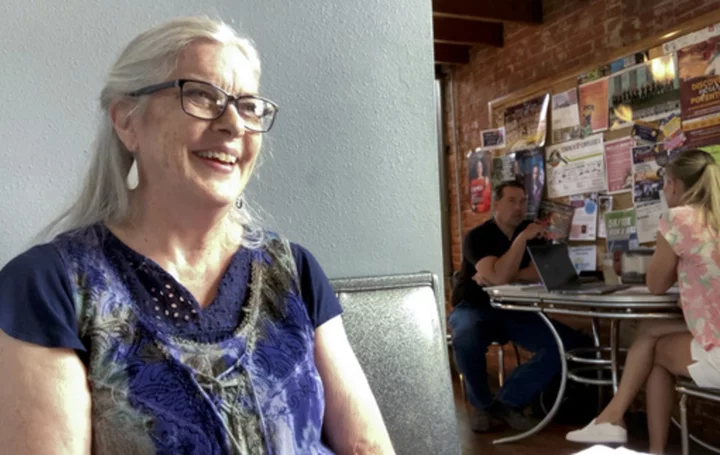Over 75,000 Kaiser Permanente unionized employees walked off the job Wednesday in the largest health care worker strike in US history. Patients say they're scrambling to find care for a variety of medical needs.
One of the largest health care organizations in the country, Kaiser has 12.7 million members, according to the company.
The striking employees — located in California, Colorado, Washington, Virginia, Oregon, Maryland and Washington, DC — include nursing staff, dietary workers, receptionists, optometrists, and pharmacists. A coalition of unions representing them say staff shortages have left them feeling overworked and burnt out, and they are demanding higher pay among other demands.
Kaiser warned that the effects felt by patients in Colorado, Oregon and California "could be more substantial."
While Kaiser told patients that "[a] strike should not dissuade anyone from seeking necessary care" for "urgent or timely medical care" in a statement Wednesday, some members seeking non-emergency and elective services say they are struggling to get the help they need with little communication.
Several patients who spoke to CNN in Los Angeles on Thursday reported no problems at the hospital located on Sunset Boulevard but others said they have struggled with issues such as delays, a lack of information about scheduled procedures, postponed diagnostic ultrasounds or lab work and not having anyone available on site to ask for help.
Patient unsure if wife's surgery will go ahead as scheduled
After three weeks of trying to get a doctor, Michael Signorio says he is uncertain of when he will be able to see a surgeon for a torn meniscus due to the ongoing Kaiser understaffing.
As a bus driver for the Orange County Transportation Authority, "I need those legs to drive," Signorio told CNN Tuesday, citing the long wait for care. And not knowing when appointments will ultimately be scheduled is adding to the inconvenience. "I've been off work for a little bit now and I'm not liking it, I'm sure work's not liking it," he said.
Signorio's wife was also meant to go in for surgery Wednesday and had no information from Kaiser on whether the operation was still on, as of Tuesday afternoon.
"We're going to be going to bed tonight. We're going to go through the whole procedure and stuff. She won't eat after eight o'clock tonight and the whole thing, and we're supposed to be here at 6:30 in the morning. So, do we show up when the picket line shows up?" Signorio wondered. "I'm hoping for a phone call. If not, we're going to continue through with it like we're supposed to."
Even with the medical uncertainty he and his wife face, the seven-year Kaiser member says he understands and supports the strike.
"I do get it and I understand, so I'm prepared to reschedule and go back again," he said.
Cancer patient turned away
Scheduled for semiweekly lab work, Christina Campbell's mother is a cancer patient who relies on Kaiser services for treatment. With the strike, however, getting her routine checks has been impossible.
Campbell's mother was turned away Thursday morning, leaving her having to look elsewhere for urgent medical assistance.
"There's nobody at the reception desks," Campbell told CNN. "I think Kaiser should be stepping up and doing a little better job of keeping their facilities staffed. This, this is just wrong. You know, this is wrong on all levels...I feel bad for the nurses, but I feel worse for the patients."
Rescheduled appointments
Jennifer Fry was scheduled for an ultrasound to confirm her pregnancy and now faces a pushed-back appointment. "[I]t was quite disappointing obviously, as I was looking forward to making sure my pregnancy is developing as it should and that it's located in my uterus (versus the fallopian tube)" Fry told CNN over email.
Other patients cite issues getting booster shots and an ongoing unavailability of open appointments, with some even considering switching from Kaiser to get necessary care.
"My son has had ongoing issues with his knee locking and we haven't been able to schedule an appointment due to the strike. During the last few months most of his doctors appointments have been rescheduled and overall everything has been very slow," Fidel Vasquez told CNN over email.
Vasquez, who is immunocompromised, says he has also had issues getting a Covid-19 booster for himself.
"[M]y family and I are considering moving from Kaiser to an alternative insurance company because we are highly dissatisfied."
Phone appointment for a fractured arm
After fracturing her arm last week, Julie Zuchowski had an orthopedic appointment scheduled for Friday but she got a call switching the in-person visit to an over-the-phone meeting.
"[I]f I don't agree I cannot be seen until the end of the month," Zuchowski, located in Los Angeles, wrote to CNN. "How can my fractured arm be evaluated over the phone?"
Zuchowski was also told to get x-rays ahead of her appointment but was unable to get any assistance from numerous Kaiser radiology departments Thursday.
"I either received a message that the office was closed without any explanation on the reason why they were closed or when I finally reached someone to speak to, I was told that there is no current outpatient x-ray services at Kaiser and I could try back next week but they could not guarantee they would be open," Zuchowski told CNN over email.
"I cried when I walked into the threshold of the hospital."
Larriesha Malbrough, a Kaiser patient in Los Angeles — and a healthcare worker at a different hospital (not part of a union) — teared up telling CNN she felt bad crossing the picket line as she entered the hospital to be seen in the ER.
"It was difficult because you see all the faces, you see the struggle, you don't want to go past what they're going for and what they're fighting for because that could be you one day," she said. "I teared up and I cried and I felt bad, and I even told the personnel there 'I'm so sorry, I'm so sorry.' I felt bad," she added.









